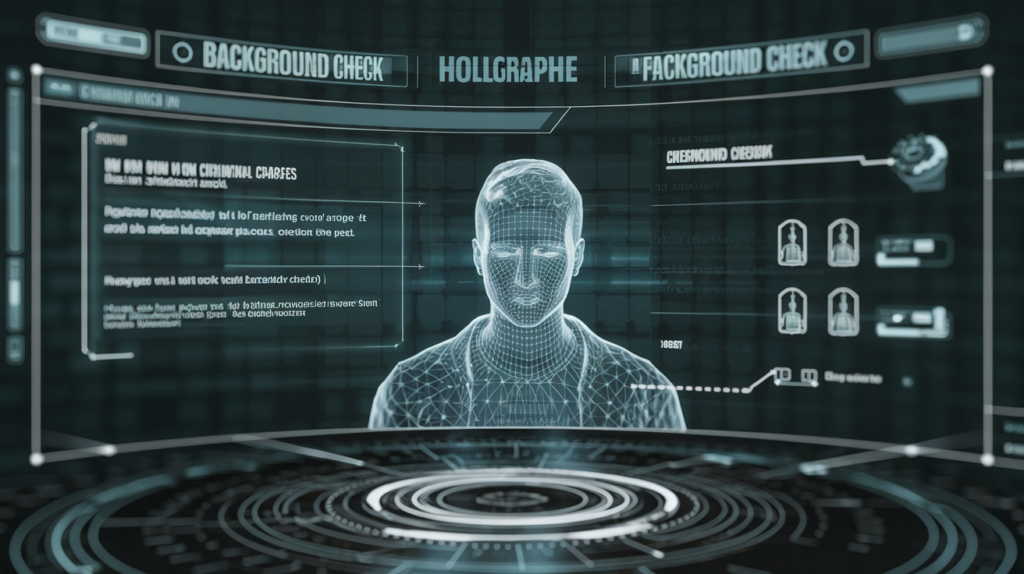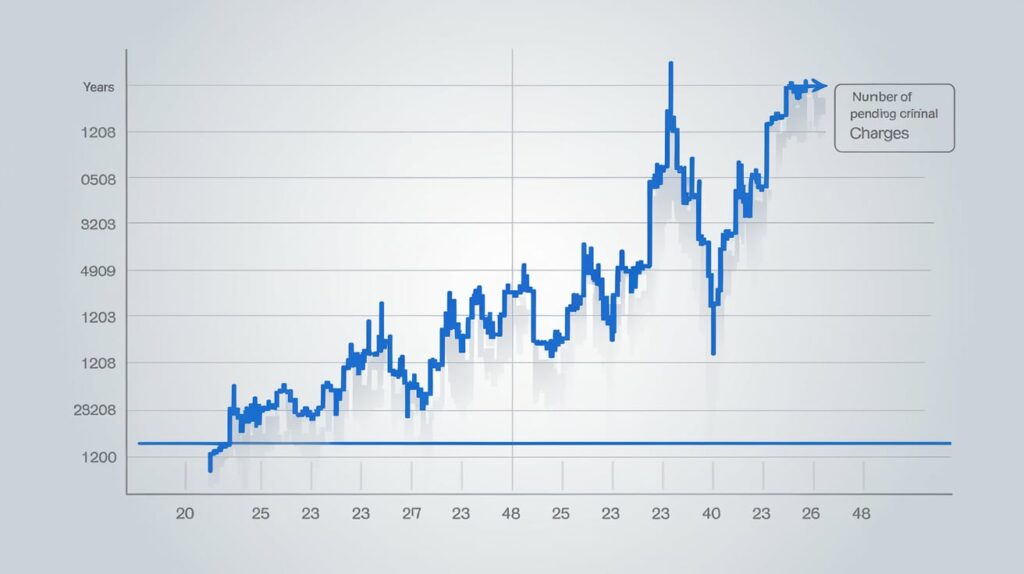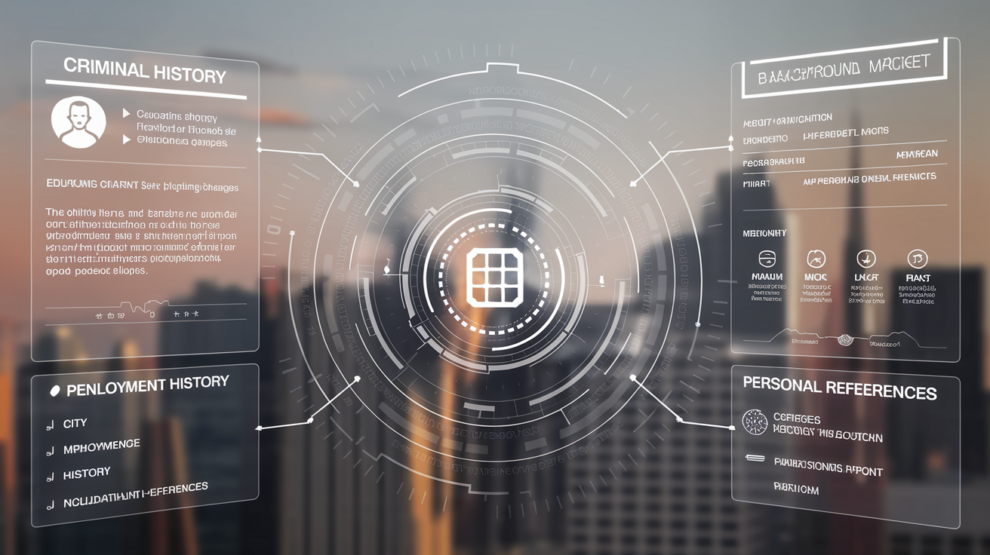Navigate Your Job Search in 2025: Learn How Pending Criminal Charges Impact Background Checks and Secure Your Next Opportunity!
Table of Contents
Job seekers with pending criminal charges often face uncertainty about how these charges might affect their employment prospects. In 2025, background checks remain a common hiring tool, but whether pending charges appear and how they’re handled varies by check type, employer practices, and state laws. This blog explores whether pending criminal charges show up on background checks, the types of checks involved, employer interpretations, legal protections, and practical tips for job seekers to navigate the hiring process confidently while addressing pending charges.
Types of Background Checks That Reveal Pending Charges
Background checks vary in scope, depth, and data sources, which determines whether pending criminal charges—cases filed but not yet resolved—appear in the results. In 2025, employers use different types of checks depending on the job’s requirements, budget, and industry standards. Below, we detail four common types of background checks that may reveal pending charges, including how they work, their costs, and their likelihood of capturing pending charges.
County/State Criminal Checks
These checks access court records from specific counties or states where the applicant has lived, worked, or been charged. They are the most common type of background check for entry-level or mid-level jobs, used by 60% of employers for non-sensitive roles (SHRM, 2023).
How They Work: Employers or third-party vendors query public court databases in targeted jurisdictions, pulling records of arrests, convictions, and pending charges. These checks are limited to the geographic areas specified, typically the applicant’s current or recent residences.
Pending Charges: Pending charges appear if they’ve been filed and are publicly accessible in the court system. For example, a pending misdemeanor in Cook County, Illinois, would show up on a county check if the employer searches that jurisdiction. However, if the check is limited to a different county, the charges may be missed.
Cost: $10-$50 per jurisdiction, depending on the state or county’s fees and vendor charges.
Likelihood of Revealing Pending Charges: High, if the check covers the jurisdiction where charges are filed. Small businesses or local employers may limit searches to one or two counties, reducing the chance of detecting charges filed elsewhere.
National Criminal Database Checks
These checks, conducted by private vendors like Checkr, Sterling, or HireRight, aggregate data from multiple sources, including state and county courts, sex offender registries, and other public records. They are popular for mid-sized to large employers due to their broader scope.
How They Work: Vendors compile data from thousands of jurisdictions into a centralized database, providing a nationwide overview of criminal records. These databases are not exhaustive and may have gaps due to inconsistent reporting across jurisdictions.
Pending Charges: Pending charges often appear if reported to the database by the relevant court. For instance, a pending DUI charge in California may show up if the court updates its records promptly. However, delays in court reporting or incomplete databases can result in missed charges.
Cost: $30-$100 per check, depending on the vendor and depth of the search.
Likelihood of Revealing Pending Charges: Moderate to high, but less reliable than county/state checks for recent or localized charges due to potential data lags. Employers in retail or hospitality often use these for efficiency.
Federal Criminal Checks

Federal criminal checks focus on crimes prosecuted in federal courts, such as tax evasion, drug trafficking, or fraud. These are less common, used primarily for roles in finance, government, or high-security industries.
How They Work: Employers access federal court records through systems like PACER (Public Access to Court Electronic Records), checking for federal cases tied to the applicant’s name or identifiers.
Pending Charges: Pending federal charges, such as a fraud case under investigation, will appear if filed and accessible in federal court records. These checks are unlikely to capture state or local pending charges.
Cost: $50-$150, reflecting the specialized nature of federal searches.
Likelihood of Revealing Pending Charges: High for federal charges, but irrelevant for most state or local pending charges. These checks are rare for entry-level jobs like retail or food service.
FBI Fingerprint Checks
FBI fingerprint-based checks, also known as Identity History Summary checks, are the most thorough, accessing the FBI’s national criminal database. They are used for high-security roles (e.g., law enforcement, childcare, or federal jobs).
How They Work: Applicants submit fingerprints, which are cross-referenced with the FBI’s database of arrests, convictions, and pending charges nationwide. This check requires formal processing through approved channels.
Pending Charges: Pending charges can appear if reported to the FBI by local or state agencies, though not all jurisdictions share this data consistently. For example, a pending assault charge may show up if the arresting agency submitted it to the FBI.
Cost: $50-$150, including fingerprinting fees and processing costs.
Likelihood of Revealing Pending Charges: Moderate to high, but these checks are uncommon for most private-sector jobs due to cost and complexity. They’re typically reserved for roles requiring high trust or security clearance.
Key Takeaways: County/state checks are the most likely to reveal pending charges in specific jurisdictions, while national database checks offer broader but less reliable coverage. Federal and FBI checks are rare for most jobs but may capture pending charges in specific contexts. Basic checks for retail or food service jobs may miss pending charges if limited to convictions or unrelated jurisdictions.
How Employers Interpret Pending Charges in 2025
In 2025, employers’ reactions to pending criminal charges vary based on their hiring policies, the job’s nature, and legal constraints. With 80% of employers conducting background checks (SHRM, 2023), understanding how they interpret pending charges is crucial for job seekers. Below, we explore the factors influencing employer decisions, how “ban-the-box” laws shape practices, and the range of outcomes for applicants.
Factors Influencing Interpretation:
- Nature of the Charge: Employers assess whether the charge is relevant to the job. For example, a pending theft charge may raise concerns for a retail cashier role but be less relevant for a construction laborer. Serious charges (e.g., violent felonies) are more likely to impact hiring than minor ones (e.g., misdemeanor traffic violations).
- Job Relevance: High-trust roles (e.g., childcare, finance) have stricter scrutiny, while high-turnover roles (e.g., food service, warehousing) may overlook minor charges. For instance, a restaurant hiring servers may prioritize availability over a pending non-violent charge.
- Recency: Recent charges raise more red flags than older ones, as they suggest ongoing legal issues. Employers may ask for context or updates on the case’s status.
- Company Policy: Progressive employers, especially those with fair-chance policies, may overlook minor, non-relevant charges, focusing on skills and references. Conversely, risk-averse employers may rescind offers for serious pending charges unless resolved.
Impact of “Ban-the-Box” Laws: In 2025, 35 states and over 150 localities have “ban-the-box” laws, which delay criminal history inquiries until after a conditional offer (e.g., California, Illinois). This gives applicants a chance to showcase qualifications before disclosing pending charges. Some employers may still withdraw offers upon discovering serious charges, but others allow candidates to explain or provide evidence of rehabilitation.
Outcomes:
- Progressive Employers: Companies like Walmart or Starbucks, with fair-chance initiatives, may overlook minor pending charges if the applicant demonstrates reliability (e.g., through references or certifications).
- Cautious Employers: Small businesses or roles involving cash handling may rescind offers for charges like theft unless the case is dismissed or irrelevant to the job.
- High-Turnover Industries: Food service (14.7 million workers, 70%+ turnover) or construction (650,000 annual openings) often prioritize hiring speed, making them more lenient toward pending charges.
Key Takeaways: Employers weigh the charge’s relevance, severity, and recency against job requirements. “Ban-the-box” laws and fair-chance policies increase opportunities for applicants with pending charges, especially in high-demand industries where skills trump past records.
State Laws on Reporting Pending Charges
State laws in 2025 significantly influence whether and how pending criminal charges are reported on background checks, creating a patchwork of regulations that job seekers must navigate. Below, we detail three key legal frameworks affecting pending charge reporting, including their implications and variations across states.
Ban-the-Box Laws
Adopted in 35 states and over 150 localities (e.g., California, Illinois, Massachusetts), “ban-the-box” laws prohibit employers from asking about criminal history on initial job applications, delaying inquiries until later in the hiring process (e.g., after a conditional offer).
Impact on Pending Charges: These laws reduce the early impact of pending charges by allowing candidates to demonstrate qualifications first. For example, in California, employers cannot ask about criminal history until a job offer is made, and pending charges must be evaluated for job relevance under EEOC guidelines. However, states without these laws (e.g., West Virginia) allow earlier inquiries, increasing the visibility of pending charges.
Implications: Job seekers in ban-the-box states have a better chance to explain pending charges in context, improving hiring odds. Always check your state’s labor department website for specific rules.
Seven-Year Rule
Some states, like Texas, California, and New York, limit the reporting of non-convictions (e.g., arrests, pending charges, or dismissed cases) to seven years from the date of the incident, particularly for consumer reporting agencies under state consumer protection laws.
Impact on Pending Charges: In these states, pending charges older than seven years may not appear on background checks conducted by third-party vendors, though court-based checks (e.g., county searches) may still reveal them if publicly accessible. For example, a pending charge from 2017 in Texas may be excluded from a 2025 vendor report but could appear in a direct court check.
Implications: This rule benefits applicants with older pending charges, but its applicability depends on the check type and state. Verify your state’s reporting limits via the labor department or legal counsel.
Expungement/Sealing
If pending charges are dismissed or resolved without a conviction, many states (e.g., New York, Illinois, Pennsylvania) allow sealing or expungement, removing them from public records and preventing them from appearing on most background checks.
Impact on Pending Charges: Once sealed, dismissed charges typically do not appear on standard checks, allowing applicants to legally state “no record” if asked about criminal history. For example, in New York, a dismissed misdemeanor can be sealed, barring it from employer reports unless the job involves high security (e.g., FBI checks).
Implications: Job seekers should pursue dismissal or sealing of charges where possible, consulting a lawyer to navigate state-specific processes. This can significantly improve hiring prospects.
Key Takeaways: State laws like ban-the-box, seven-year rules, and expungement/sealing policies vary widely, affecting whether pending charges are reported. Job seekers should research their state’s regulations (via labor department websites or legal aid) to understand their rights and options.
Your Rights Under the Fair Credit Reporting Act (FCRA) and EEOC

Job seekers with pending criminal charges are protected by federal laws ensuring transparency and fairness in background checks. The Fair Credit Reporting Act (FCRA) and Equal Employment Opportunity Commission (EEOC) guidelines provide critical safeguards. Below, we detail these protections and how to leverage them in 2025.
Fair Credit Reporting Act (FCRA)
The FCRA regulates consumer reports, including background checks conducted by third-party vendors (e.g., Checkr, HireRight). It ensures transparency and accuracy in the hiring process.
Key Rights:
- Consent: Employers must obtain your written permission before running a background check through a third-party vendor. This applies to 80% of employers using external services (SHRM, 2023).
- Disclosure: If an employer takes adverse action (e.g., denies a job) based on the check, they must provide you with a copy of the report, a summary of FCRA rights, and the vendor’s contact information.
- Dispute Process: You can dispute inaccurate or incomplete information (e.g., a pending charge listed as a conviction) with the vendor, who must investigate within 30 days. If unresolved, file a complaint with the Federal Trade Commission (FTC).
Implications: If an employer fails to obtain consent or provide a report, you can challenge the process legally. Always request a copy of the background check to verify pending charge details.
Equal Employment Opportunity Commission (EEOC)
The EEOC enforces anti-discrimination laws, issuing guidelines on criminal history in hiring to prevent unfair treatment of applicants with records, including pending charges.
Key Guidelines:
- Employers must assess the nature (severity of the charge), time elapsed (how recent), and job relevance (e.g., a pending theft charge for a cashier vs. a laborer) before denying employment.
- Blanket bans on applicants with criminal records (including pending charges) are prohibited, as they disproportionately harm protected groups (e.g., minorities).
- Employers should allow candidates to explain pending charges or provide evidence of rehabilitation (e.g., completed programs, references).
Implications: If denied a job due to pending charges, you can file an EEOC complaint if the decision seems discriminatory or ignores rehabilitation efforts. This is particularly relevant in states with ban-the-box laws.
Key Takeaways: The FCRA ensures transparency and dispute rights, while EEOC guidelines promote fair consideration of pending charges. Job seekers should request background check copies, verify accuracy, and challenge unfair denials via the FTC or EEOC.
Tips for Job Seekers with Pending Charges in 2025
Navigating the job market with pending criminal charges requires proactive strategies to build trust and highlight qualifications. Below, we outline five key tips to improve26 improve hiring chances, supported by practical advice and data.
Be Transparent
Advice: If asked about criminal history (typically post-offer in ban-the-box states), disclose pending charges concisely, focusing on context and rehabilitation. For example, say, “I’m addressing a minor issue from [date] and have completed [program or counseling].” Honesty builds trust, as lying can lead to termination if discovered later.
Why It Works: Transparency aligns with EEOC guidelines, showing accountability and reducing employer skepticism. A 2020 CareerBuilder survey found 80% of employers value references, which can reinforce your reliability.
Target Inclusive Employers
Advice: Seek second-chance employers like Goodwill, Walmart (select locations), or local restaurants that prioritize skills over records. Use platforms like 70millionjobs.com, which lists fair-chance jobs in industries like food service (14.7 million workers, 70%+ turnover) or construction.
Why It Works: These employers are more likely to overlook minor pending charges, focusing on work ethic and qualifications, especially in high-demand sectors.
Upskill
Advice: Obtain certifications to enhance employability, such as OSHA 10-hour ($25-$100) for construction or ServSafe ($15-$150) for food service. Online platforms like Coursera offer affordable courses to build skills.
Why It Works: Certifications demonstrate commitment and competence, offsetting concerns about pending charges. Employers value tangible qualifications in tight labor markets (e.g., 650,000 construction openings annually).
Prepare References
Advice: Secure 2-3 professional or personal references (e.g., former coworkers, mentors) to vouch for your reliability and character. Provide their contact details on applications or during interviews.
Why It Works: References are checked by 80% of employers (CareerBuilder, 2020), providing credibility and counterbalancing concerns about pending charges.
Consult a Lawyer
Advice: Work with a legal professional to understand your charges’ status, potential for dismissal, or sealing eligibility. For example, in New York, dismissed charges can be sealed, preventing them from appearing on most checks.
Why It Works: Legal clarity allows you to address employer questions confidently and pursue outcomes (e.g., dismissal) that improve your record.
Key Takeaways: Transparency, targeting inclusive employers, upskilling, strong references, and legal guidance help job seekers with pending charges present themselves as reliable candidates, increasing hiring chances in 2025.
Can You Still Get Hired With Pending Criminal Charges?

Yes, securing employment with pending criminal charges is possible in 2025, particularly in high-turnover industries where skills and availability are prioritized over background vetting. Below, we explore why hiring is feasible, which industries and employers are most open, and strategies to improve success.
Feasibility: Pending charges are not convictions, and many employers, especially in labor-short industries, focus on current qualifications rather than unresolved legal issues. The food service industry (14.7 million workers, 70%+ turnover) and construction sector (650,000 annual openings) often hire quickly, overlooking minor charges if irrelevant to the job. For example, a pending traffic violation is unlikely to affect a restaurant server role, while a theft charge may concern retail but not landscaping employers.
Industries and Employers:
- Food Service: Small restaurants or chains like Chipotle hire servers or cooks ($12-$20/hour) based on interviews or trial shifts, often skipping checks due to urgency.
- Construction: Small contractors hire laborers ($15-$22/hour) based on skills or OSHA certifications, prioritizing project deadlines.
- Gig Platforms: DoorDash or TaskRabbit drivers ($15-$25/hour) require only basic eligibility (e.g., driver’s license), bypassing extensive checks.
- Second-Chance Employers: Companies like Walmart, Home Depot (select locations), or nonprofits like Goodwill offer roles like stockers or retail associates ($12-$18/hour) with fair-chance policies.
Strategies for Success:
Leverage Second-Chance Resources: Use 70millionjobs.com or Goodwill’s job placement services to find employers open to hiring despite pending charges.
Disclose Concisely: If asked, briefly explain the charge’s context and emphasize rehabilitation (e.g., “I’m resolving a minor issue and have strong references.”). Per EEOC guidelines, this builds trust.
Demonstrate Rehabilitation: Highlight completed programs, certifications, or references to show commitment. For example, a ServSafe certification can outweigh a minor pending charge for a cook role.
Target High-Demand Roles: Apply for jobs in industries with labor shortages, where hiring speed trumps vetting. For instance, construction firms value OSHA training over clean records.
FAQs about Do Pending Criminal Charges Show Up on Background Checks
Q: Will all background checks show my pending charges?
Not always. County/state checks often show pending charges, but basic or limited-scope checks may not. Check type and jurisdiction matter.
Q: Can I hide pending charges from employers?
Be honest if asked, as lying can lead to termination. If charges are sealed or dismissed, you may legally say “no record,” per state laws.
Q: What if my pending charges are dismissed after a background check?
Inform the employer and provide court documentation. Under FCRA, you can dispute inaccurate reports to update your status.
Q: Are there jobs that never check for pending charges?
Yes, roles in food service, construction, or gig work (e.g., Upwork, DoorDash) often skip checks, focusing on skills or basic eligibility.
Conclusion
In 2025, pending criminal charges may appear on some background checks, but their impact depends on the check type, employer practices, and state laws. By understanding which checks reveal charges, leveraging legal protections like the FCRA and EEOC guidelines, and targeting inclusive employers, job seekers can navigate the hiring process with confidence. Transparency, upskilling, and networking are key to securing roles in high-demand industries like food service or gig work. Start exploring opportunities today, armed with knowledge and strategies to turn challenges into career success.
Do Follow Dragcast on Social Media For More Such Content.









Add Comment